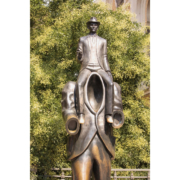Kafkaesque
Franz Kafka, born in 1883 Prague in what is now the Czech Republic, wrote atmospheric and influential German-language novels and short stories in the early twentieth century. His works include Amerika, The Trial, and The Castle, and the famous short story The Metamorphosis where a man wakes in his bed to find himself transformed into a large and unwelcome insect. Kafka presents a surreal, fascinating and frustrating world filled with uncertainty and anxiety when dealing with a faceless and unfathomable state apparatus.
The adjective kafkaesque usually means something is suggestive of Franz Kafka’s writings, particularly having a bizarre, nightmarishly complicated, incomprehensibly threatening or illogical quality. The term is often applied to inconvenient and incomprehensible administrative procedures and decisions. Kafkaesque has become widely used in English, with a meaning now broad enough to cover inexplicable, threatening, mysterious, mystifying, absurd, paradoxical, surreal, labyrinthine, uncanny, nightmare-like, or whatever the speaker may regard as strikingly strange.
This word is written as kafkaesk in German but actually sounds the same as the English word. The suffix -esque in English and the suffix -esk in German both derive from the French suffix -esque and likewise form adjectives meaning “in the style or manner of,” or “similar to, resembling.” Other examples include Chaplinesque, picturesque, and Rubenesque.




